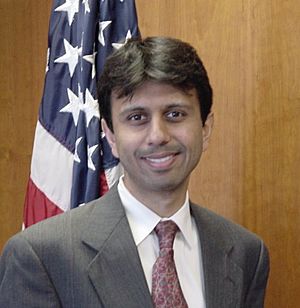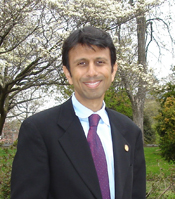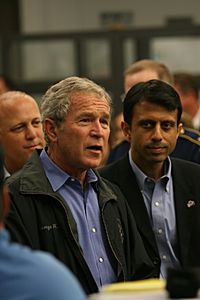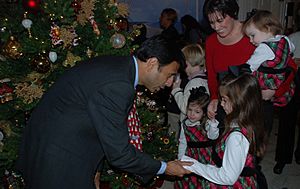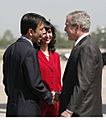Bobby Jindal facts for kids
Quick facts for kids
Bobby Jindal
|
|
|---|---|
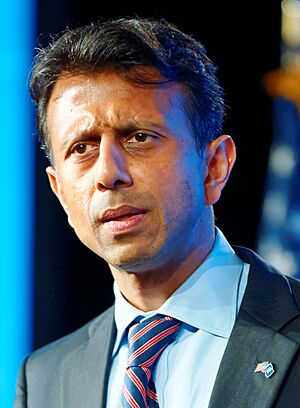
Jindal in 2015
|
|
| 55th Governor of Louisiana | |
| In office January 14, 2008 – January 11, 2016 |
|
| Lieutenant | Mitch Landrieu Scott Angelle Jay Dardenne |
| Preceded by | Kathleen Blanco |
| Succeeded by | John Bel Edwards |
| Member of the U.S. House of Representatives from Louisiana's 1st district |
|
| In office January 3, 2005 – January 14, 2008 |
|
| Preceded by | David Vitter |
| Succeeded by | Steve Scalise |
| Assistant Secretary of Health and Human Services for Planning and Evaluation | |
| In office July 9, 2001 – February 21, 2003 |
|
| President | George W. Bush |
| Preceded by | Margaret Hamburg |
| Succeeded by | Michael O'Grady |
| Personal details | |
| Born |
Piyush Jindal
June 10, 1971 Baton Rouge, Louisiana, U.S. |
| Political party | Republican |
| Spouse |
Supriya Jolly
(m. 1997) |
| Children | 3 |
| Education | Brown University (BS) New College, Oxford (MLitt) |
| Signature |  |
Piyush "Bobby" Jindal (born June 10, 1971) is an American politician who was the 55th governor of Louisiana from 2008 to 2016. As a member of the Republican Party, Jindal also served in the U.S. House of Representatives for Louisiana.
He became the first Indian American governor in United States history. When he was elected, he was also the youngest governor in the country.
In 1995, at just 24 years old, Jindal was put in charge of Louisiana's Department of Health and Hospitals. Later, he became the youngest-ever president of the University of Louisiana System. In 2001, President George W. Bush made him a top advisor on health issues.
Jindal first ran for governor in 2003 but lost. He then won a seat in the U.S. Congress in 2004. In 2007, he ran for governor again and won. He was re-elected easily in 2011.
On June 24, 2015, Jindal announced he was running for president of the United States. He ended his campaign later that year. He finished his second term as governor in January 2016.
Contents
- Early Life and Education
- Starting a Career in Public Service
- First Run for Governor
- Serving in the U.S. Congress
- Winning the Governor's Race
- Leading Louisiana as Governor
- Jindal on the National Stage
- Running for President
- What Jindal Believes: Key Issues
- Family and Personal Life
- See also
- Images for kids
Early Life and Education
Bobby Jindal was born on June 10, 1971, in Baton Rouge, Louisiana. His parents, Amar and Raj Jindal, had moved to the United States from Punjab, India, just six months before he was born. His father was an engineer, and his mother worked in physics and later in information technology.
Jindal grew up near Louisiana State University. He went to Baton Rouge Magnet High School, where he was a great student. He played tennis and started several small businesses, including a computer newsletter and a candy business.
He graduated from Brown University in 1992 at age 20. He earned honors in two subjects: biology and public policy. He was accepted into medical school and law school but decided to study at the University of Oxford in England as a Rhodes Scholar. There, he earned a master's degree in political science, focusing on health policy.
Starting a Career in Public Service
After finishing his studies, Jindal worked for the business consulting firm McKinsey & Company. He also worked as an intern for U.S. Congressman Jim McCrery of Louisiana. McCrery was so impressed with Jindal that he introduced him to Louisiana's governor, Mike Foster.
In 1996, Governor Foster appointed Jindal to be the Secretary of the Louisiana Department of Health and Hospitals. Jindal was only 24 years old. The department was in charge of about 40% of the state's budget. Under his leadership, the state's Medicaid program went from being deeply in debt to having extra money.
In 1999, Jindal became the youngest-ever president of the University of Louisiana System. Two years later, President George W. Bush appointed him as a top policy advisor to the Secretary of Health and Human Services in Washington, D.C.
First Run for Governor
In 2003, Jindal returned to Louisiana to run for governor. He finished first in the primary election, where candidates from all parties compete. He was supported by major newspapers and politicians.
In the final election, he ran against Kathleen Blanco, a Democrat. Blanco won the election with 52% of the vote. Even though he lost, the campaign made Jindal a well-known political figure in Louisiana.
Serving in the U.S. Congress
A few weeks after the governor's race, Jindal decided to run for the U.S. House of Representatives. He won the election in 2004 with 78% of the vote, becoming only the second Indian American ever elected to Congress. He was easily re-elected in 2006.
While in Congress, Jindal served on several important committees, including the Committee on Homeland Security. He was also chosen as an assistant majority whip, which is a leadership role in the House.
Winning the Governor's Race
On January 22, 2007, Jindal announced he would run for governor of Louisiana again. This time, he was the favorite to win from the start.
On October 20, 2007, he won the election with 54% of the vote, defeating eleven other candidates. This was a historic victory. It was the first time a non-incumbent (someone not already in office) won the governor's race without needing a second, runoff election.
Leading Louisiana as Governor
Jindal took office as governor on January 14, 2008. At 36, he was the youngest governor in the U.S. at the time. He was also Louisiana's first non-white governor to be elected.
First Term (2008–2012)
As governor, Jindal focused on ethics reform and improving the state's finances. He signed laws to make government more honest. He also cut taxes, including the largest income tax cut in the state's history.
In 2008, Jindal's leadership was tested by Hurricane Gustav. He ordered one of the largest evacuations in U.S. history, moving nearly two million people to safety. His quick actions were praised for saving lives and were seen as a big improvement over the government's response to Hurricane Katrina in 2005.
Second Term (2012–2016)
Jindal was re-elected in 2011 with over 65% of the vote. In his second term, he continued to push for his policy goals.
He proposed a plan to get rid of the state's income tax and replace it with a higher sales tax. He believed this would help businesses grow. However, the plan did not get enough support in the state legislature and was dropped.
Jindal also focused on education reform. He supported creating more charter schools and introduced a voucher program. This program allowed students from low-income families to use public funds to attend private schools. These changes were controversial and led to protests from some teachers and public school supporters.
By the end of his second term, Jindal's popularity in Louisiana had dropped. The state was facing budget problems. He could not run for a third term because of term limits.
Jindal on the National Stage
Because of his success in Louisiana, many people saw Jindal as a rising star in the Republican Party.
In 2008, there was talk that he might be chosen as the vice-presidential running mate for John McCain. Jindal said he was not interested and wanted to focus on being governor.
In 2009, he was chosen to give the official Republican response to President Barack Obama's first major speech to Congress. In his speech, Jindal criticized the president's economic plans. The speech received mixed reviews.
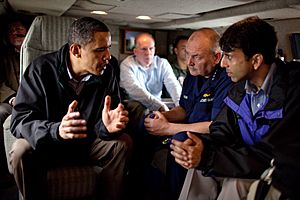
After the 2012 presidential election, Jindal became the head of the Republican Governors Association. He urged his party to connect better with middle-class voters.
Running for President
For years, people wondered if Jindal would run for president. On June 24, 2015, he officially announced his campaign for the Republican nomination in the 2016 election.
His campaign focused on his conservative ideas and his experience as a governor. However, he struggled to gain support in a crowded field of candidates.
On November 17, 2015, Jindal ended his presidential campaign. He said, "I've come to the realization that this is not my time."
What Jindal Believes: Key Issues
- Taxes: Jindal is a strong supporter of cutting taxes. As governor, he signed the largest income tax cut in Louisiana's history. He believes lower taxes help the economy grow.
- Education: He supports school choice, including charter schools and voucher programs. He also supported the Common Core State Standards Initiative for many years before changing his position.
- Gun Rights: Jindal is a strong supporter of the Second Amendment, which protects the right to own guns. He has been endorsed by the NRA Political Victory Fund.
- Health Care: Jindal opposed the Affordable Care Act (also known as Obamacare). He believes in market-based solutions to make health insurance more affordable.
- Environment: As governor, he supported coastal restoration projects. He also promoted alternative energy research. However, he has been critical of some government environmental regulations.
Family and Personal Life
Jindal was raised in the Hindu faith but converted to Catholicism in college. His first name is Piyush, but he has gone by "Bobby" since he was a child. He got the nickname from the character Bobby Brady on the TV show The Brady Bunch.
In 1997, he married Supriya Jolly. They have three children: Selia, Shaan, and Slade. Supriya Jindal is an engineer and created a foundation to help improve math and science education for children in Louisiana.
Since leaving office in 2016, Jindal has worked in the private sector for an investment firm and serves on the board of a telehealth company.
See also
- List of Asian Americans and Pacific Islands Americans in the United States Congress
- List of minority governors and lieutenant governors in the United States
- Republican Party presidential candidates, 2016
Images for kids
-
Governor Jindal at 2015 Southern Republican Leadership Conference, Oklahoma City, OK
-
Jindal in June 2008, at a John McCain campaign event in Kenner, Louisiana
-
Bobby Jindal speaking at the 2015 Conservative Political Action Conference (CPAC) in National Harbor, Maryland on February 26, 2015
-
Jindal talks to residents of Krotz Springs, Louisiana, during the 2011 flooding of the Mississippi River
-
Bobby and Supriya Jolly Jindal meet with then-President George W. Bush.
-
Governor Jindal and local officials discuss the response to the 2010 Gulf of Mexico oil spill
 | George Robert Carruthers |
 | Patricia Bath |
 | Jan Ernst Matzeliger |
 | Alexander Miles |


